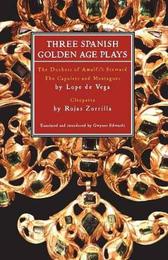
|
Three Spanish Golden Age Plays: The Duchess of Amalfi's Steward; The Capulets and Montagues; Cleopatra
Paperback / softback
Main Details
| Title |
Three Spanish Golden Age Plays: The Duchess of Amalfi's Steward; The Capulets and Montagues; Cleopatra
|
| Authors and Contributors |
By (author) Lope De Vega
|
|
By (author) Roja Zorrila
|
|
By (author) Prof Gwynne Edwards
|
| Series | Play Anthologies |
|---|
| Physical Properties |
| Format:Paperback / softback | | Pages:224 | | Dimensions(mm): Height 198,Width 129 |
|
| Category/Genre | Plays, playscripts
Anthologies |
|---|
| ISBN/Barcode |
9780413774750
|
| Classifications | Dewey:862.308 |
|---|
| Audience | | General | | Tertiary Education (US: College) | | Professional & Vocational | |
|---|
|
Publishing Details |
| Publisher |
Bloomsbury Publishing PLC
|
| Imprint |
Methuen Drama
|
| Publication Date |
24 February 2005 |
| Publication Country |
United Kingdom
|
Description
Three classic Spanish plays, made famous by Shakespeare and Webster Two of the most famous and successful playwrights of Spain's Golden Age of playwriting were Lope de Vega (1562-1635) and Rojas Zorrilla (1607-48). From their prodigious output, the three plays in this volume, based on similar sources to Shakespeare's and Webster's versions, provide a fascinating comparison with their Jacobean counterparts. Lope's The Duchess of Amalfi's Steward, in contrast to Webster's play, focuses on the nobility of love, with characters who are complex and appealing. His Romeo-and-Juliet story, The Capulets and Montagues, is a fast-moving mixture of serious and comic, with an ending that will surprise and entertain. Rojas' treatment of Cleopatra, with its rich imagery, emphasises the love theme, held within a knot of jealous relationships. A full introduction by Gwynne Edwards sets the plays in context and provides a thorough study of the individual works.
Author Biography
Lope de Vega (1562-1635), acknowledged as Spain's most lyrical and energetic dramatist, was a prolific and complusive writer. He treated an enormous range of subjects, often mingling comedy with tragedy, to the horror of the classicists, and defended his methods in his 'Arte nuevo de hacer comedias en este tiempe', published in 1609. Francisco de Rojas Zorilla was born in Toledo on 4 October 1067, when Lope de Vega was 45 years old and an experienced and successful dramatist. In comparison, Rojas is less well known than Lope, the equivalent perhaps of Webster to de Vega's Shakespeare. The eldest son of a naval officer, Rojas probably received his university education at the prestigious University of Salamanca, after which he returned to Madrid and concentrated on writing for the theatre. By 1632, when he was 25, he had already gained a reputation, particularly as a court dramatist. Even at the beginning of his career he was collaborating with the most successful dramatists of his day, including Calderon, Luis Velez de Guevara, Perez de Montalban, and Antonio Coello. His principal works are Del rey abajo ninguno and No hay padre siendo rey. He died at the age of 41 in 1648, possibly as a result of foul play. Gwynne Edwards has prepared a new free adaptation of the play, from a literal translation by Jennifer Bakst. Gwynne Edwards is a specialist in Spanish theatre and cinema and, until recently, Professor of Spanish at the University of Aberystwyth, Wales. He has also translated and adapted more than forty plays from Spanish, French and Italian, many of which have been staged at major theatres in Britain and the United States. He has published three collections of Lorca's plays with Methuen Drama, and also collections of seventeenth-century Spanish and contemporary Spanish-American plays adapted from the correspondence and prose writings of Dylan Thomas. His books include Lorca: The Theatre Beneath the Sand, Lorca: Living in the Theatre, Dramatists in Perspective: Spanish Theatre in the Twentieth Century, The Discreet Art of Luis Bunuel and Almodovar: Labyrinths of Passion.
|